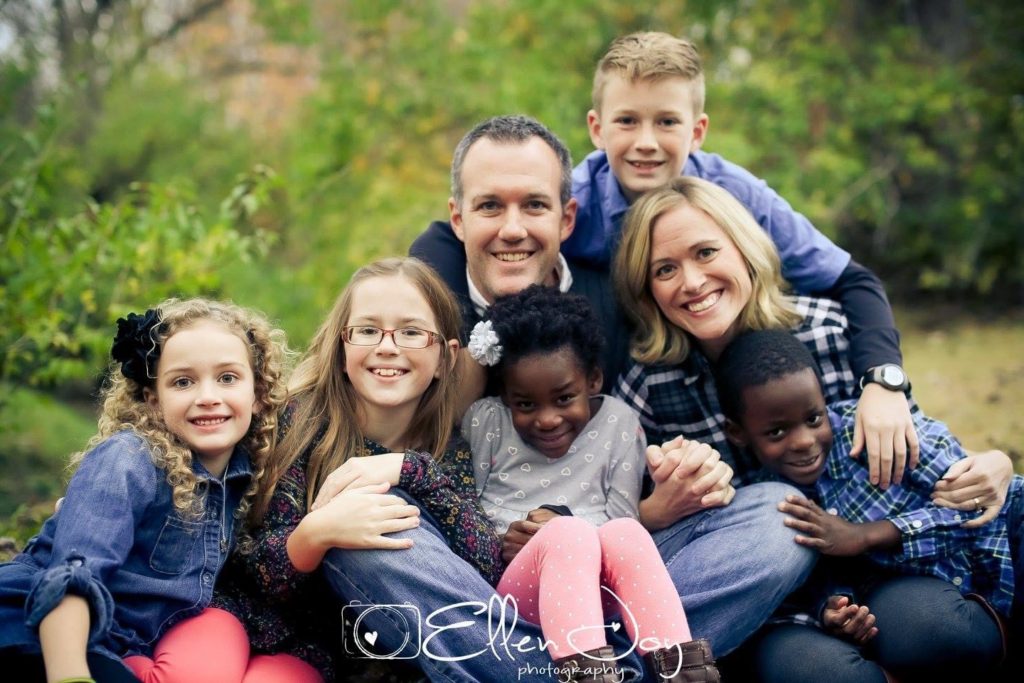This week, we’re going to hear from one of our new launch team members, Missy Flint. She gives us some wisdom on parenting and racism, and things she’s learned through her experience adopting children who don’t come from the same culture as her. Also be sure to check out Carter’s previous blog on racism: God Loves Justice, and our previous blogs on parenting: Don’t Be An Angry Parent and Stop Struggling As A Parent.
Over the last couple of weeks, the entire country has been talking about race. For many, though, these racial issues aren’t the hot news topic for the moment; they’re a lifetime of real experiences. Hard experiences. My husband and I fall into the unique category of being White, yet raising a multi-racial family after adopting two Black children from the Democratic Republic of Congo in central Africa nearly ten years ago. When we walked into the world of transracial adoption and sat through the classes on how to parent a child of a different race, I confess that my rose-colored glasses and White privilege blinded me from the truth that so many brothers and sisters have lived their entire lives.
Raising two Black children as a White mother has definitely changed my perspective. I’ve seen the disapproving glances. I’ve heard the hateful rhetoric yelled at our family. I’ve picked up my daughter from her Sunday school class to hear that she was told by a four-year-old child that she couldn’t be played with because of her beautiful brown skin. I hate that it took my own family experiencing racism for me to open my eyes to the realities of it.
I don’t have all of the answers and am continuing to seek wisdom from the Lord on this issue for myself as well, but I’ve learned some things through the years. Here are some thoughts about what we as White people can do to love Black people well and make our world a safer and better place for everyone:
1. Pray
Just as David prayed in Psalm 139: 23-24, “Search me, O God, and know my heart; test me and know my anxious thoughts. See if there is any offensive way in me, and lead me in the way everlasting,” we should be asking the Lord to reveal any racism or prejudices in our own heart, confessing that as sin, and asking Him to give us a heart like His. While this seems like an obvious first place to start, please don’t blow through this quickly. We ALL have prejudices we carry, myself included, and it’s really important that we acknowledge and deal with them. In addition, we should pray for healing in our land, for protection and equality for all people of color, for unity and desegregation, especially within our churches, and for God to reveal to us ways that we can make a difference. When we take the racial injustices happening here on earth to our heavenly Father, we allow our hearts to be broken for the things that break His and we open the door for Him to work in amazing ways.
2. Listen
Whether talking with a friend or coworker who is sharing their personal experience when it comes to dealing with racism, reading an article, or engaging on social media, White people should not dismiss Black people’s feelings or minimize their hurts. Yes, there are troubles of many kinds that we all face, but I’ve seen too many White people discount the heartache of Black people and deny that racism still exists. We are called to bear one another’s burdens (Galatians 6:2) and weep with those who weep (Romans 12:15) and just because we haven’t personally experienced something, doesn’t mean that systemic and personal racism isn’t real.
3. Don’t Be “Colorblind”
Well-meaning people often speak of not even seeing color in others, yet for many, skin color is a huge part of their identity. When we say that we fail to see color (which honestly, none of us really do), it can make others feel like they aren’t fully known as individuals. God created diversity and it’s a beautiful thing. Rather than claiming to ignore it, we should celebrate it. Let’s see each other’s color, discover the ways we’re all similar as members of the human race, and praise the creativity of our creator God in our cultural and racial differences.
4. Be an Active Part of the Change
If you’ve been guilty of discrimination, prejudice, racism, or even apathy in the past, the Gospel story tells us that it’s not too late to change and calls us to true repentance. But don’t stop there! I’d encourage you to read books, watch movies or documentaries, listen to podcasts, or plug into whatever form of media you prefer to educate yourself on the history of racial injustice in our country. Listening to a variety of voices helps expand our understanding, so don’t be afraid to step outside of your comfort zone and seek out viewpoints that differ from your own current one. If you have children, talk to them regularly about racism and teach them about Black history and its many heroes. When you hear someone making a racist comment or joke, speak up. Get involved in local events that support racial reconciliation or reach out to your elected officials to speak out for racial justice. Let’s link arms with people of color and do our part to make the world a better place.
While I’ll never know what it feels like to be Black, I do know what it feels like to worry deeply for my Black children in ways that never crossed my mind for my White kids. It really is a whole different world out there for people of color, and while I’m incredibly saddened that it has taken the senseless loss of many Black lives for the entire country to take notice, I hope and pray that real and lasting change can finally take place. Because of Jesus, it’s possible! May it start with us!

Missy Flint
Missy is a mom of five, and an amazing wife to Jason! They just moved to Roanoke and are excited to help plant Redemption Church.
